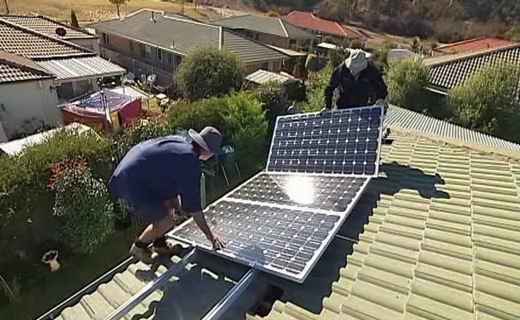 Image above: Tax subsidized photovoltaic panels being installed on roof in New South Wales, Australia. From (http://www.abc.net.au/news/stories/2009/03/13/2515891.htm).
By Jeffrey Mikulina on 6 April 2010 in Star Bulletin -
(http://www.starbulletin.com/editorials/20100406_2_policies_could_change_Hawaiis_energy_game.html)
Image above: Tax subsidized photovoltaic panels being installed on roof in New South Wales, Australia. From (http://www.abc.net.au/news/stories/2009/03/13/2515891.htm).
By Jeffrey Mikulina on 6 April 2010 in Star Bulletin -
(http://www.starbulletin.com/editorials/20100406_2_policies_could_change_Hawaiis_energy_game.html)
Thirty-five days. That — according to the 2009 Hawaiian Electric Industries Annual Report — is the length of time before Hawaii's electricity shuts off should something disrupt the flow of oil to our islands. It's the length of time between comfort and chaos.
If Hawaii hopes to free itself from this dangerous addiction to imported fuel, we'll need to change our energy game. Rolling the dice on the availability of cheap oil is a gamble that just doesn't work in an era of changing economies, changing world order and a changing climate.
Two such game-changing policies are currently pending before Hawaii lawmakers. The first, House Bill HB 2643, would eliminate the upfront cost of solar energy and efficiency for homeowners across the state. The second, HB 2421, would tack a small surcharge on most oil consumed in the state and apply those funds to clean energy and agricultural security programs.
ACCESS TO CLEAN ENERGY
Most Hawaii residents would like to use solar energy in their homes, but they don't. The upfront cost of solar — whether it is a few thousand dollars for solar water heating or tens of thousands for photovoltaic — is the deal breaker.
So what if we could eliminate that upfront cost by putting the power of government bond financing to work? That's exactly what Berkeley and dozens of other cities have done. Called "property assessed clean energy," or PACE, the program essentially allows a homeowner to use bond money to pay for solar or energy efficiency investments. The bond is then repaid over time through an increase in the homeowner's property tax. The magic is that the homeowner's energy savings exceed the increase in property tax, decreasing the cost of living immediately.
Residents benefit immediately by lowering the cost of home ownership; the state benefits with an increase in clean energy; and the economy benefits from having steady growth in high-tech clean energy and efficiency jobs. The program is genius — enough that Harvard Business Review named it one of the "Top 10 Breakthrough Ideas" for 2010.
By removing the upfront cost of solar and energy efficiency, a Hawaii PACE program would make clean energy accessible to households from Hilo to Hanalei. It changes the game.
PUTTING A TAX ON CARBON
Beyond using solar and energy efficiency at home, broad changes need to be made in how we produce and use energy. The critical elements of Hawaii's clean energy future — efficiency, smart-grid infrastructure and planning — require up-front investment. It makes sense to tap the source of our problem, imported oil, to invest in our clean energy solutions.
The right policy would discourage oil use while providing funding to promote clean energy alternatives. An oil tax could raise tens of millions of dollars annually at a monthly cost to residents that's equivalent to a Starbucks "grande" coffee. Unlike most other taxes, residents can easily offset the barrel tax: a few compact fluorescent bulbs and keeping the car's tires properly inflated will offset any additional cost.
The idea of an oil tax for clean energy has support among experts — and residents. In a Washington Post interview last month, U.S. Energy Secretary Steven Chu, a Nobel Prize-winning physicist, stated, "I absolutely believe a price on carbon is essential."
According to two separate statewide surveys, an astounding 70 percent of Hawaii residents would be willing to pay $5 additional each month on energy bills if the money went to fund clean energy solutions. Rarely does an opportunity to pay more for something receive such broad support.
But the success of the policy rests on lawmakers' ability to resist the urge to reroute the revenue to the general fund. The funds from the carbon tax should be used to wean Hawaii from oil, with first priority being energy efficiency programs aimed at lowering residents' and businesses' energy bills. While other programs are certainly worthwhile, reducing oil's burden on our economy would simply make everything else more affordable. The carbon tax would be a down payment on our clean energy future — something that would pay future dividends to every resident and business in the state.
Done right, these two policies would truly change the energy game in Hawaii. We need to make clean energy accessible to all and provide dedicated funding to our preferred energy future. While passing such bold measures takes political courage, doing nothing leaves us with only 35 days of comfort.
• Jeffrey Mikulina is executive director of the Blue Planet Foundation. See www.cleanenergyhawaii.org for more information on these measures.
No comments :
Post a Comment